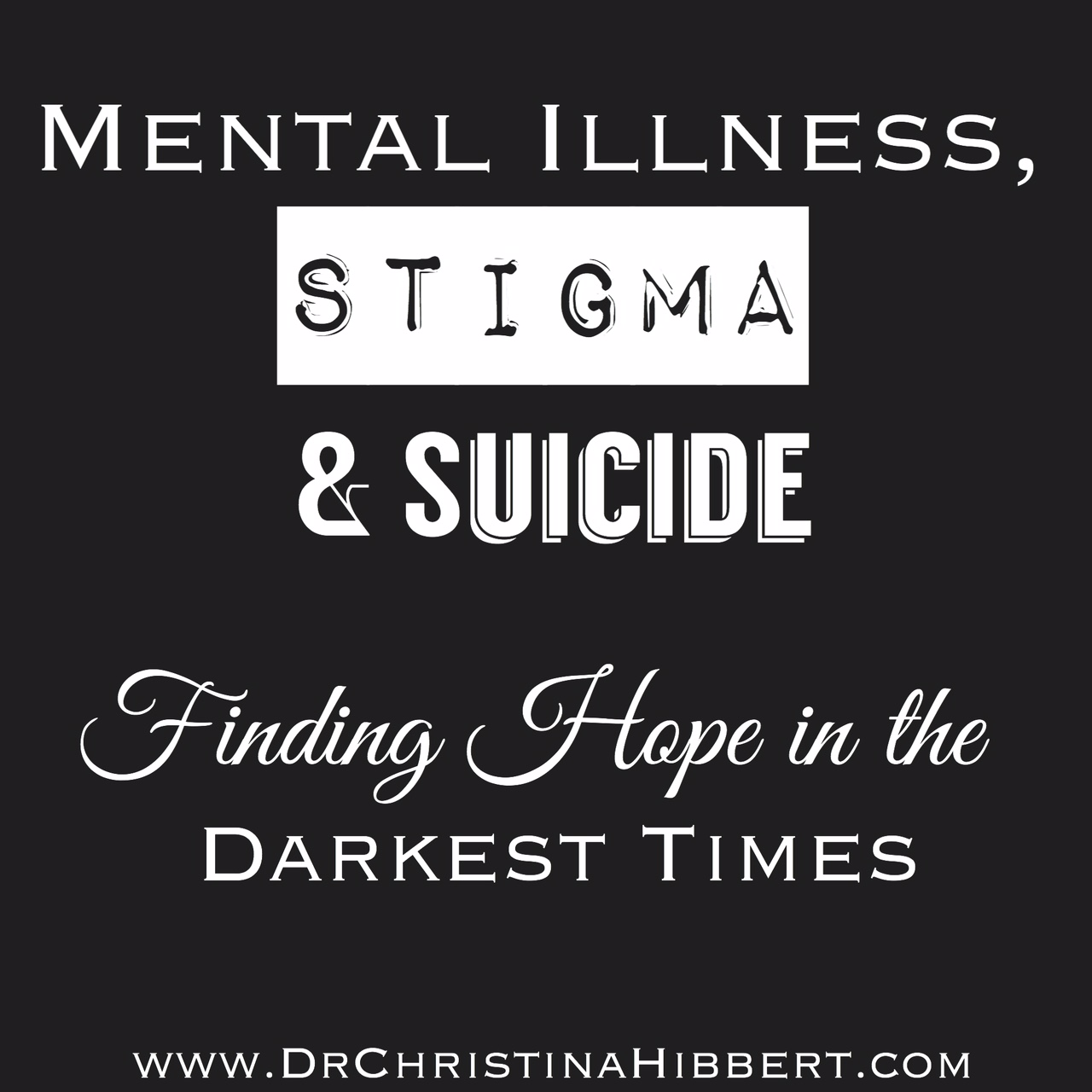
11 Sep Mental Illness, Stigma & Suicide: Finding Hope in the Darkest Times
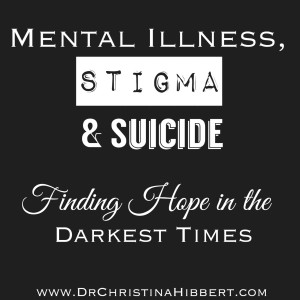 **I realize this is a tough subject to talk about, and I do speak very candidly in this article about some painful, but important, things. If you are in a vulnerable place right now and in any way feel triggered by these topics, then please do not read this at this time.**
**I realize this is a tough subject to talk about, and I do speak very candidly in this article about some painful, but important, things. If you are in a vulnerable place right now and in any way feel triggered by these topics, then please do not read this at this time.**
I didn’t plan to be writing about death and suicide this week. I wanted to be writing about happier things, like back-to-school or fulfilling your life’s purpose (like we’re working on in my Personal Growth Group). But I’m compelled to write on this topic today,b because, once again, suicide has reared its ugly head in my life, by taking the lives of two more of those whom I loved.
A couple weeks ago, my husband’s cousin lost his life after over four decades of struggling with self-esteem, mental illness, and just plain old life. And just two days ago, a dear friend who had suffered so much and overcome so much, finally lost her battle with depression, anxiety, and bipolar disorder.
This friend, Naomi, suffered from postpartum depression and psychosis years ago, which resulted in her committing infanticide, killing her own daughter. She served ten years in prison for this–a tragedy in itself–and even knew my friend, Hope, who is serving 40 years for child abuse as a result of postpartum psychosis (read about Hope). She was finally out, had recently married, and was finally building her new life. We met just over a month ago for lunch here in Flagstaff, because she wanted to talk with me and with my dear friend, Carole, about how she could get involved with the postpartum work we’ve been doing for years here in Arizona. She had started the Phoenix Postpartum Wellness Coalition, to advocate and support other moms struggling with postpartum depression, anxiety, and psychosis. She was even advocating for Hope, to get her out of prison, and will be featured in a forthcoming documentary on perinatal mood and anxiety disorders. She was full of life and love, and she was a beautiful person–bright and hopeful. And she lost her life to depression. (Read Naomi’s blog, her legacy, here.)
I’ve been surrounded by death my whole life, but lately, it’s been suicide. As many of you know, last year, my close friend, Jody, took her life after silently struggling with depression and anxiety. a week after Jody died, a young man at our kids’ school took his life by jumping in front of a train. Later that week, I received word that a young client of mine who also attended our kids’ school had been planning to hand herself. She’d been “inspired” by Jody and the other young man. Her mother had luckily found her suicide notes just in time to get her admitted to the hospital. And of course, almost 8 years ago, my dearest sister, Shannon, accidentally overdosed while drunk one night, after struggling on and off with depression and alcoholism (Read about my experience in This is How We Grow.)
I’m raising children who have lost a parent to mental illness and addiction. I’m a second mom to 3 more children whose mother is no longer here because she couldn’t feel how loved she was and she couldn’t accept the help that was surrounding her; the depression was too dark. And now, I’m once again grieving the loss of two more dear lives, all because of mental illness, stigma, and the dark call of suicide.
How can we help those who are suffering find hope i their darkest times, and how can we find hope in these dark times after such loss?

My family with my friend’s family, sending balloons to Jody in heaven to remember her one year death anniversary. We need each other.
It’s hard to know when someone is suffering so sorely, to know that they are considering taking their life. It’s hard to tell which of those who feel like dying (which is quite common) will actually plan and complete that death. Even when we know someone is struggling with suicidal thoughts or intentions, it’s hard to know what they’re really thinking. When Jody asked me to watch her daughter the next day for her, I knew she’d been struggling with suicidal thoughts. I thought, “What if she’s trying to be alone so she can do something to herself?’ I replied to her text, “Sure, I’ll watch her. But I’m worried about you, my friend. How are you doing?” She replied, “Doing great! Don’t worry about me! xoxoxo.” I believed her when she said she would use that time to go for a jog, to take care of herself. Instead, she took her life.
It’s hard to talk about this; we’re not supposed to talk about it. We’re not supposed to say on Facebook, “My friend died today after leaving her daughter at my house, sending her husband and older boys to school and work, and then grabbing a coffee before driving to the Grand Canyon and jumping off.” No. We can’t say that. So, instead the posts say, “It is with great sorry that I inform you that so and so died last night.” No explanation of how they died. No “died of cancer” or “died in a terrible car accident.” None of that. The silence lets us know what really happened.
But the silence is also what leads to suicide. The stigma surrounding mental illness, addiction, and thoughts of wanting to die is so huge, it keeps people who most need to scream, silent. Why can’t they just scream? Why can’t they just scream, “I’m suffering! I need help! I am NOT okay!”? One word: stigma.
Overcoming the Stigma of Mental Illness & Suicide
Stigma gags us. It puts a dirty hand over our mouth, or shoves a dirty rag inside, and stops us from speaking up when we need it most. It tells us, “You can’t admit your’e struggling. That’s weak. That’s embarrassing. No one will like you. You’ll be rejected, humiliated, or worse, feared.” Stigma IS fear. It is fear of not being good enough, fear of not being “normal.” It is others’ fear of the mentally ill, fear of seeing themselves in the mental illness, fear of becoming “like them” one day, too.
The truth is, deep down, we are all the same, mental illness or not. We all struggle in some way or another–it’s no secret! We are ALL ill, in some way, at some time of our life. Physical illness isn’t you. Mental illness isn’t you, either, and it’s not weakness. It’s like diabetes, migraines, cancer–an illness that can come and cause trouble or stress, an illness that needs attention, treatment, and care to overcome. It’s an illness, like physical illness (and maybe even more so), that needs love to overcome.
What can we do? Understand. Talk. Love.
Before we can stop the stigma, before we can begin to heal from mental illness and the pain of loss when those we love can hold on no longer, we must first understand, talk, and love. It is our only hope.
Understand. Understand that mental illness is not something to be ashamed of. Understand that, 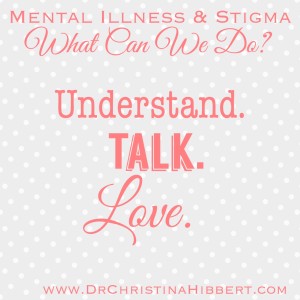 even so, it is very hard to admit and seek help for mental illness. Seek to understand those in your life who struggle. Listen. Hear.
even so, it is very hard to admit and seek help for mental illness. Seek to understand those in your life who struggle. Listen. Hear.
Understand that it’s “normal” to feel like you don’t want to be alive when you’re suffering from mental, or physical, illness, pain, or heartache. It’s NOT, however, normal to start planning to die or to act on that feeling. If this is happening, you need immediate help (see the numbers below). Seek that help. Reach out. Help others get the help they need.
Understand that suicide often follows after the darkest days have passed, when the person is starting to feel a little bit better. Watch more closely, talk more openly during this time.
Also, understand that, often those who are set on a plan for suicide seem better, happier, more relaxed. They know what they’re going to do and it feels like the right thing in that state of mind. Be there. Look at them. Look deeply to understand.
Talk. Talk about mental illness. Talk about how you feel, ask others how they’re really doing, and then listen. Connect. Be there for one another and let them know it’s okay to struggle. We all do.
Talk about receiving help and help them reach out and find the help they need. Talk to them face-to-face if you have any doubts or worries. Stay with them if you’re uncertain. Oh, how I wish I’d run out to the car that night when Jody dropped her daughter off, to SEE if she was really okay or not. I know it’s not my fault that she died, but oh how I wish I would have taken that extra step. Who knows what it could have done.
Love. Last week, my dear cousin, Eddie, and his beautiful wife, Mary, lost their sweet angel 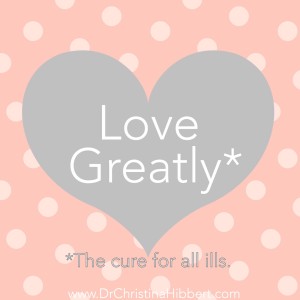 daughter when my cousin accidentally backed over her in a parking lot. She was three years old. It has devastated our entire family and the community where they live–another reason death has been on my mind. Yet, the outpouring of love for them and their other two children has been incredible. You see, not only has this tragedy occurred, but Eddie has been battling inoperable brain cancer for three years, and beating the odds. Now this. It’s too much for any family to take. And yet, they move on in faith and love, and they reach out for help and for donations to cover the funeral and thousands of dollars of medical bills, and they accept that help. And they carry on; I know they will. (More on dealing with grief, grief and the family, and grief and children, here.) (To donate to Eddie’s family, click here.)
daughter when my cousin accidentally backed over her in a parking lot. She was three years old. It has devastated our entire family and the community where they live–another reason death has been on my mind. Yet, the outpouring of love for them and their other two children has been incredible. You see, not only has this tragedy occurred, but Eddie has been battling inoperable brain cancer for three years, and beating the odds. Now this. It’s too much for any family to take. And yet, they move on in faith and love, and they reach out for help and for donations to cover the funeral and thousands of dollars of medical bills, and they accept that help. And they carry on; I know they will. (More on dealing with grief, grief and the family, and grief and children, here.) (To donate to Eddie’s family, click here.)
Why can’t we have this kind of support for all kinds of people who are suffering? For those who tragically lose a child, for those who suffer from depression, for those who are battling terrible physical illnesses, and for those who struggle to find enough value in this life to keep themselves alive. Why can’t we talk about this? Why can’t we seek to understand, to be there, to tell stigma to take a hike because we won’t allow mental illness to sit in silence any longer? Why can’t we choose to love greatly?
This is my hope–that we will begin to love greatly today. Begin to reach out, to smile, to ask, to talk, to listen. Begin to hug, to understand–to cry together, to FEEL together. Begin to expose mental illness and discuss it and seek help and let help in.
Together, we can stop the stigma that strangles us. Together, we can save lives.
Leave a comment with your thoughts, below, and let’s keep this conversation going.
If you or anyone you know needs help, please call one of the following numbers:
National Suicide Prevention Hotline: 800-273-8255
Postpartum Support International Support Line: 800-944-4773
Listen to my powerful “Motherhood” radio episode, “Shedding Light (& Hope) on the Dark Side of Motherhood” to learn more about Hope, Naomi, & this important topic.
You may manage your subscription options from your profile.
Be sure to check out my bestselling, award-winning memoir, This is How We Grow!
Available now at Amazon or Barnes & Noble!
My latest book, “Who Am I Without You,” is available now at
Target, Amazon, Barnes & Noble, New Harbinger, or your local bookseller!
Join me for one of my new webinar courses!
“Women’s Emotions Across the Lifespan: Hormones, The Brain, & Emotional Health”
“Growing Through Postpartum Depression & Anxiety”
Starting in October!
Details here: http://www.drchristinahibbert.com/products/webinars/
Let’s Connect!
SUBSCRIBE, above, “Like” me on Facebook Dr. Christina Hibbert; This Is How We Grow, & follow me on Twitter, Pinterest, & Instagram!
Related Posts/Articles:

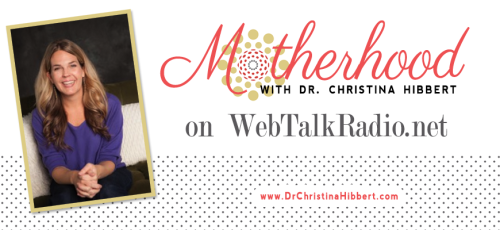

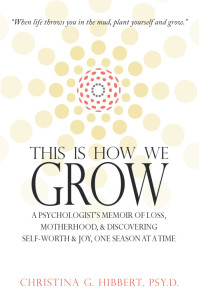
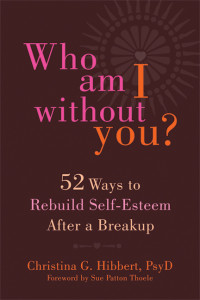
This is a topic that is so near to my heart. My husband has bipolar disorder, and almost 10 years ago I nearly lost him to suicide. Miraculously, he lived. From there he started the process of physical and mental healing. It’s a process that continues to this day.
I don’t talk about his mental health struggles or his “accident” very much because it’s his story as much as it’s mine. And he’s not ready. Because of the stigma.